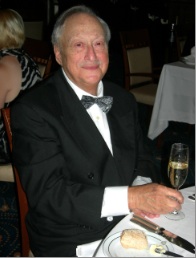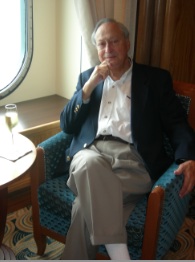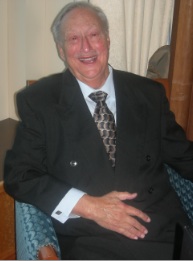Gene Brutten



BRUTTEN PH.D., GENE J, 84, a globally recognized expert in the field of speech-language pathology, died on March 4th of heart failure at Florida Hospital in Orlando. Dr. Brutten was born in New York and grew up in Brooklyn. He received his Bachelor's degree from Kent State University in 1951, his Master's Degree from Brooklyn College in 1952 and his Ph.D. from the University of Illinois in 1957. Dr. Brutten devoted his professional life to experimental and clinical research related to the nature, assessment, and treatment of stuttering. His research led to the development of the influential Two Factor Theory of stuttering documented in the seminal book "The Modification of Stuttering" co-authored with Dr. Donald J. Shoemaker. Together with Dr. Martine Vanryckeghem, Brutten published a series of standardized assessment protocols and clinical handbooks, the Behavior Assessment Battery, currently used in more than 20 countries. In addition, he published numerous book chapters, peer-reviewed articles, and delivered over 200 presentations worldwide. Gene Brutten's 50 year professional career started as a speech-language pathologist at Long Island University. He later joined the faculty at Southern Illinois University-Carbondale until 1993. Because of his outstanding contributions, he was awarded the title of Research Professor, Distinguished Professor and Professor Emeritus. In 1994, Professor Brutten joined the faculty at the University of Central Florida in the Department of Communication Sciences and Disorders. During his career, he also was a Visiting Professor in Belgium, Croatia, the Netherlands, and South Africa. One of his major joys was to educate students. Together, Dr. Brutten and his former students have advanced the field's current understanding of stuttering and its remediation. The American Speech-Language-Hearing Association bestowed its highly-prized Honors upon Dr. Brutten in recognition of his lifetime accomplishments in the field of communication sciences and disorders. He also received two Fulbright-Hays Awards. Dr. Brutten is survived by his wife, Dr. Martine Vanryckeghem, a professor at the University of Central Florida, and his two children, Lori Brutten of Washington DC and Mark Brutten of San Francisco. Donations in honor of Gene J Brutten can be made to the American Heart Association .
Reprinted here with permission Martine Vanryckeghem, March 13, 2013
UCF professor studied ways to help stutterers
March 11, 2013, By Jeff Kunerth, Orlando Sentinel
 There were two sides to Professor Gene Brutten. There was Gene: outgoing, articulate, talkative. And there was Dr. Brutten: strict, serious, studious.Together, they comprised a man who devoted his life to unlocking the debilitating condition of stuttering.
There were two sides to Professor Gene Brutten. There was Gene: outgoing, articulate, talkative. And there was Dr. Brutten: strict, serious, studious.Together, they comprised a man who devoted his life to unlocking the debilitating condition of stuttering.
A man never at loss for words helped multitudes to overcome their fear of speaking. Speech therapists in more than 20 countries use the assessment test and techniques he developed to treat stuttering. "Stuttering is an extremely debilitating and complex disorder. This impacts a person's social, academic and professional life," said Martine Vanryckeghen, his wife and colleague.
A retired University of Central Florida professor, Brutten died March 4 of heart failure. He was 84.
Brutten was a graduate student at Brooklyn College in 1952 when he took a course in stuttering while working at a hearing and speech clinic. The class propelled him into the lifelong pursuit of understanding, diagnosing and treating the affliction of stuttering.
He had the intellect to break down the components that contributed to stuttering and the compassion to understand the stutter's perspective.
"It is one thing for us clinicians to observe our clients, but it's also extremely important to get an inside view: what do you think, how do you feel?" said his wife, a UCF professor and speech-language pathologist.
He understood the effort it took to construct an alternative vocabulary to avoid words that start with B, the anxiety of answering a telephone, the reoccurring fear of places that trigger the stutter, the frustration of coping tricks that no longer worked.
With another researcher, Donald Shoemaker, Brutten broke the affliction into two components: the stuttering behaviors themselves and the coping mechanisms the person uses to avoid stuttering. They developed their findings into the Two Factor Theory.
Brutten and Shoemaker then devised treatments which they published in the book The Modification of Stuttering. To overcome the fear of talking on a telephone, for example, Brutten had the client hold a disconnected telephone receiver while carrying on a conversation with the therapist. From there, the client would move progressively farther from the therapist while talking on the phone.
Brutten, who taught at UCF's Department of Communication Sciences and Disordersfrom 1994-2000, was recognized for his lifelong achievements by the American Speech-Language-Hearing Association.
His work helped those who stutter regain control over their minds, their speech and their lives. But his treatments and techniques never were a cure for the affliction.
"We can do a lot to make it better, but we had no cure for stuttering," said Vanryckeghen, his wife of 20 years.
Dr. Brutten couldn't give to his clients what came so easily for Gene: the glibness that could start a conversation with anyone, anywhere.
"He was a talker -- very outgoing, very social," Vanryckeghen said. "He would talk to anyone, people we don't know, the person sitting next to you in a restaurant."
But he knew too when to keep quiet.
On the days when it was his turn to cook, Gene Brutten would most likely have something Italian on the stove in their Winter Springs home, and some crooner on the stereo. To the smells in the kitchen and the voice of Tony Bennett, he liked to take Martine in his arms and dance around the bit kitchen like it was a cruise-ship ballroom.
Besides his wife, Brutten is survived by son Mark Brutten of An Francisco and daughter Lori Brutten of Washington.
National Creamaton & Burial Society, Oviedo, is handling arrangements.
Used with permission of the Orlando Sentinel, copyright 2013.

From a 1966 conference - see all participants here
From a brochure advertising The 6th Annual Gene J. Butten Symposium on Fluency held Friday, February 29, 2008 at the University of Central Florida in Orlando (http://www2.cohpa.ucf.edu/comdis/documents/20086thBruttenSymposium.pdf)
Gene J. Brutten, Ph.D.
Gene Brutten's contributions to the understanding of fluency disorders, and its treatment has been recognized nationally and internationally. He has lectured at universities in three continents and has been a visiting professor at the University of Gent in Belgium, the University of Nijmegen in the Netherlands and the University of Witwatersrand in South Africa. In 1971, and again in 1978, he received a Fulbright-Hays award to conduct clinically-based research at the University of Utrecht in the Netherlands. Dr. Brutten, who is dually certified, is a fellow of ASHA. He has also been awarded its certificate of recognition and certificate of appreciation. Dr. Brutten is a founding member of the International Fluency Association and served as the editor-in-chief of its Journal of Fluency Disorders from 1989 to 2000. He has published more than 70 journal articles and 20 book chapters on stuttering and has given over 200 professional presentations. He was the co-author of the seminal book, The Modification of Stuttering, in which it was proposed that, for assessment and therapeutic purposes, the dysfluencies of stutterers need to be differentiated from the escape and avoidance responses that they use to cope with stuttering and its anticipation. In this regard, he has developed a Two Factor approach to therapy and the Behavior Assessment Battery. The battery's procedures have been translated for use by clinicians and researchers in countries such as Belgium, Croatia, Israel, Japan, Pakistan, the Netherlands, Spain and Sweden. In 2002, Dr. Brutten received the ASHA Honors in recognition of his lifetime accomplishments in the field of communication disorders and sciences.
Several of Dr. Brutten's publications are listed on ResearchGate
Friends Remember
- Gene was a treasure. When Oliver Bloodstein and I were writing the last edition of the Handbook, Gene would spend hours with me on the phone going over how best to rewrite old sections on the role of learning theory in stuttering. Gentle but incisive, he was a marvelous teacher, and I felt truly privileged to have the time to discuss our mutual love for the science. He will be much missed. (Nan Bernstein Ratner)
- I am so saddened by the news of Dr. Gene Brutten. He was such a mentor to so many of us that did not study with him. He was such a wealth of knowledge and always fair in his discussions at meetings. I will miss his friendship and expertise. (Susan Fosnot)
- From Fred Murray (personal correspondence) - Having gained insight from Gene Brutten's many writings, I regret having been able to meet him only once or twice. However, I am pleased to say that my many recent professional contacts with his widow, Martine, have proven to be very rewarding indeed.

